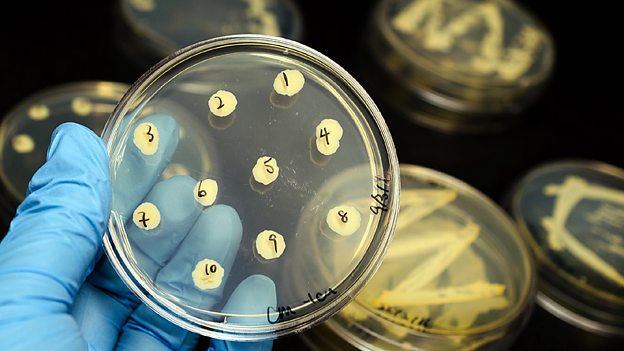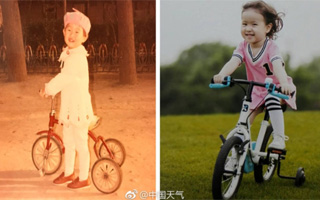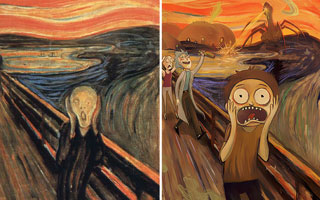一项由英国政府委托调研的报告结果显示,如果人们再不行动起来对抗“超级病菌”的话,那么到 2050 年,平均每三秒钟,超级病菌就会夺走一个人的生命。英国医生建议人们减少抗生素的使用。本期内容讨论人类对越来越多的细菌产生抗药性的担忧。
课文内容
词汇: medicine 药物
If you live in England and have a mild infection, don't ask your GP to recommend antibiotics. He'll probably say 'no' and give you something else. This is part of an initiative to put a stop to harmful infections becoming resistant to these drugs.
Recent figures from the NHS have shown that the number of prescriptions for all types of antibiotics were down by 7.3% on the previous year to about 34 million in 2015 and 2016, which is considered a success by the authorities.
Peter Taylor, Professor of Microbiology, UCL School of Pharmacy, says that antibiotics are probably "the safest and most effective drugs ever produced, but they have an Achilles heel - every time we use an antibiotic it alters the levels of bacteria out there in the environment and engenders resistance in a way that is very similar to Darwinian natural selection".
The power of these substances was discovered by Alexander Fleming in 1928 almost by chance. The Scottish bacteriologist returned to his laboratory after a holiday to find a bacteria-free circle around a growth of mould on a Petri dish. It gave us our first antibiotic: penicillin.
The availability of these drugs revolutionised the treatment of infections. In the past STIs spread by bacteria were often incurable and deadly. Today all it takes to treat them is a trip to the clinic and a course of antibiotics. Childbirth was very dangerous and routinely ended in death for both mother and baby. Now the risk of a woman dying in England and Wales during labour is between 40 and 50 times lower than 60 years ago.
Bacteria will continue to evolve to seek survival and we have to up our game. There hasn't been a new class of antibiotics since the 1980s and pharmaceutical companies are looking into a wide-range of alternatives – from compound from insects to nanotechnology - to develop new weapons in the continuous war against superbugs.
词汇表
infection 感染
GP (general practitioner) 全科医生,普通医师
antibiotics 抗生素
NHS (National Health Service) 全民医疗服务制度
prescription 处方,药方
microbiology 微生物学
pharmacy 药店,(此处指)药剂学
Achilles heel 致命弱点,致命伤
Darwinian natural selection 达尔文的自然选择(学说)
bacteriologist 细菌学家
mould 霉,霉菌
Petri dish 皮氏培养皿
penicillin 盘尼西林,青霉素
STI (sexually-transmitted infections) 性传播疾病
incurable 无法治愈的
labour 分娩
pharmaceutical 制药的
nanotechnology 纳米技术
superbug 超级病菌
测验与练习
1. 阅读课文并回答问题。
1. Why won't doctors give you antibiotics if your illness is not very serious?
2. How does Professor Peter Taylor describe the weakness in antibiotics?
3. True or false? Alexander Fleming expected the fungus to kill bacteria when he returned to his laboratory.
4. How much safer has childbirth become in the last few decades?
5. Which two words in the text include prefixes meaning "very small"?
2. 请你在不参考课文的情况下完成下列练习。选择一个意思合适的单词填入句子的空格处 。
1. My brother is going to university. He wants to study __________.
bacteriologist pharmaceutical pharmacy a course of antibiotics
2. I've got a bad rash on my elbow. The doctor will give me a __________ for a very effective ointment.
antibiotic Petri dish mould prescription
3. In the past it was very difficult to cure __________.
childbirth penicillin STIs labour
4. The doctor told me he has to operate on me tomorrow. That's the only way to treat my illness - there's no __________.
availability Achilles heel resistance alternative
5. Mark spent his first year at university partying and having fun. If he wants to get a diploma he has to __________ and study more.
up his game be my game game up win the game
答案
1. 阅读课文并回答问题。
1. Why won't doctors give you antibiotics if your illness is not very serious?
Because the constant use of antibiotics make bacteria develop a resistance to them.
2. How does Professor Peter Taylor describe the weakness in antibiotics?
He says they have an "Achilles heel".
3. True or false? Alexander Fleming expected the fungus to kill bacteria when he returned to his laboratory.
False. He discovered the bacteria-killing power of the fungus by chance.
4. How much safer has childbirth become in the last few decades?
The risk of a woman dying in England and Wales during childbirth is between 40 and 50 times lower than 60 years ago.
5.Which two words in the text include prefixes meaning "very small"?
MICRObiologist, NANOtechnology.
2. 请你在不参考课文的情况下完成下列练习。选择一个意思合适的单词填入句子的空格处 。
1. My brother is going to university. He wants to study pharmacy.
2. I've got a bad rash on my elbow. The doctor will give me a prescription for a very effective ointment.
3. In the past it was very difficult to cure STIs.
4. The doctor told me he has to operate on me tomorrow. That's the only way to treat my illness - there's no alternative.
5. Mark spent his first year at university partying and having fun. If he wants to get a diploma he has to up his game and study more.












